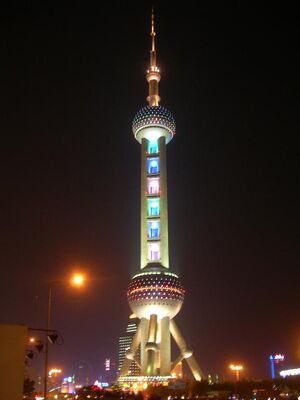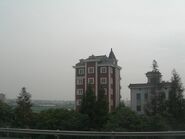
| |
| Location of Yue | 
|
| Official languages | Wu Chinese, Mandarin Chinese |
| Capital | Hangzhou |
| Largest City | Shanghai |
| Population | 19,496,000 |
| HDI | 0.944 |
| Republic formed | 1821 |
| Currency | Chinese Yuan (CNY) |
| Our Timeline Equivalent | Jhejiang and southeastern Jiangsu province (PRC) |
Yue was formerly called the Republic of Wuyue (吳越民國 / Wúyuè Mínguó). They continued to be called Wuyue until the Republic of China changed to the Republic of Wu. At that time, Wuyue dropped the "Wu" and became the Republic of Yue. To make matters more confusing, Yue's main language (and co-official with Mandarin) is Wu. Yue is part of the Chinese Union. Yue's largest city, Shanghai, is the most populous city in the world, and makes Yue a major player in world affairs (particularly economic affairs).

The Oriental Pearl Tower in Shanghai
History[]
Although there were previous states in the area known as "Wu" and "Yue", from which the later nation would name itself, the year 907 is generally thought to have been the founding of what is now called Yue. The ancient kingdom of Wuyue was founded by the Qián ("Si5" in modern Wu language) family. Qian Liu had been named Prince of Yue, and later, Prince of Wu, under the Tang Dynasty. However, in 907, partly as a result of the public's dislike of the recent attempts at suppressing Buddhism, the Tang Dynasty fell and Qian Liu proclaimed himself king of Wuyue. Qian Liu helped his new nation to prosper. On his death-bed he urged a benign administration of state affairs and his words were strictly followed by four succeeding kings. However, as the Song Dynasty gained power, Wuyue was threatened. Just 71 years after its foundation, in 978, in the face of certain annihilation from northern imperial Chinese troops, the last king of Wuyue, Qian Chu, pledged allegiance to the Northern Song Dynasty, saving his people from war and economic destruction. Thus, Wuyue was incorporated into the Song Dynasty. However, it was able to retain its own culture and some degree of autonomy. Song rule lasted until the end of the dynasty in 1368, after which Wuyue again gained independence. This time, it would last, more or less, as no other nation was able to conquer it completely. In the early years of this new independence, the Ming Dynasty took hold to the north. Is captital was Nanjing, which was nearly at Wuyue's doorstep. However, the first Ming Emperor decreed that the northern barbarians were a threat to the Ming Dynasty and should be actively defended against, while war should not be made with the largely non-threatening southern nations. In 1403, the Ming Capital was moved from Nanjing to Beijing, which seemed to indicate that they did not, in fact, want to conquer the southern nations, including Wuyue. Since that time, Wuyue has become a major player in world affairs, especially after the decision of the Ming Dynasty to become more isolationist, which made Shanghai one of the major ports from which to trade with the Chinese nations, as it had no such restrictions. After the dissolution of the Ming Dynasty and the eventual formation of the current nations of Jonggwo and Wu in its place, Wuyue changed its name simply to "Yue" because of Wu objections - Wu saw itself as the rightful heir to the "Wu" name. Today, Shanghai is the largest city in the world, and one of the most wealthy also. Hangzhou - its capital - and many other cities are also replete with many ancient treasures and are generally thought to be some of the most beautiful cities in the world.
Demographics[]
Vegetarianism[]
- 72% Vegetarian
- 28% Non-Vegetarian
Ethnic Groups[]
- 95% Han Chinese
- 85% Yue Han Chinese
- 10% other Han Chinese
- 02% Europeans
- 01% Indians
- 02% others (chiefly Chinese minorities and Japanese)
Religion[]
- 42% Freethinker
- 23% atheist
- 19% agnostic
- 32% Buddhist*
- 17% Daoist*
- 05% Jain
- 02% Jewish
- 02% other (chiefly Hindu, Christian, and Cathar)
- (*Buddhism and Daoism are practiced together by many people. Also, even atheists and agnostics sometimes take part in some religious rituals, even if they aren't religious.)
Gallery[]
References[]
Some OTL info taken from the Wikipedia articles "Wuyue" and "Ming Dynasty".






